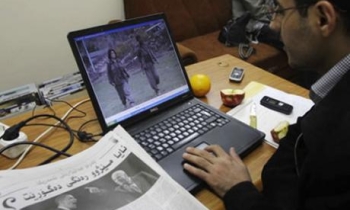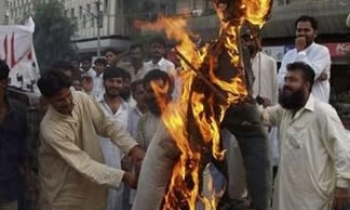A year and a half following the violent shockwaves sent across the Islamic world with the publication of 12 editorial cartoons depicting Prophet Mohammed and criticizing Islam in Danish newspaper Jyllands-Posten, culture editor Flemming Rose said he apologizes for offending the sentiments of Muslim people but has no regrets as that would mean succumbing to pressure and compromising freedom of expression.
“There is a distinction to be made between saying ‘I am sorry for having offended you' and the very right as an editor as a publisher to publish what I find necessary no matter who might be offended,” said Rose in an exclusive interview to the Turkish Daily News.
He said there were many rights in democracy but the only right you do not have is the right not to be offended. “In a democracy you cannot insist on a right not to be offended because the consequence will be a severe limitation of freedom in our society,” Rose said.
Over 150 people died in February 2006 in violent protests that engulfed most parts of the Islamic world, causing Danish Prime Minister Anders Fogh Rasmussen to describe this as his country's worst international crisis since World War II.
Rose, who was forced to go on an extended holiday leave because of rampant protests and death threats, has long returned to his work and says he no longer feels insecure. He stressed that many Islamic countries have communicated him that he was unwelcome and would not be issued visa. Turkey was not one of those countries.
No regrets
Asked whether after all the trouble lived and the accumulated experience whether he would publish the “Mohammad cartoons” again, Rose said “This is a rather hypothetical question. Experience has taught me that I should not answer hypothetical questions because you never know what will happen and reality is rather unpredictable…”
Rose stressed, however, that no matter how he answered such a question it would be problematic. “If I tell you ‘Yes, I will do it again today' first, I should say, already it is an old journalistic idea and it is not a good thing to plagiarize yourself or to repeat yourself. From a creative point of view, you would have to come up with another idea if you would have to confront the same news story. But, having said that, if I say ‘Yes I will do it again today' a lot of people would say I am cynical and I don't think about the consequences of my acts and that I am a bad person. If I say ‘No, I will not do it again' I will have deliver a victory for all those who have killed, threatened, intimidated and I will send a message to them saying ‘You know, if you intimidate us enough, if you make enough trouble, we will do exactly as you please…' I think that would be a defeat for everything I have been fighting for in this case… So, I do not regret having published those cartoons.”
In analyzing the developments since the cartoons crisis, Rose said he believed one has to make a distinction between what happened in Denmark and in Europe and what happened in the Middle East.
“In Denmark and in Western Europe though I agree a lot of people have been offended, but as I keep on saying, I am being offended every day, other people are being offended and we have a very good debate about on the one hand what does it mean to have free speech, whether there are limits, and if so, what these limits are. And we have had a very constructive debate about integration: How much should a receiving society be willing to compromise its own values and standards to new comers? And, to what extend the new comers have to adapt to standards, values, norms in the society they are joining in? I would argue – and even a lot of people who disagreed with the decision to publish the cartoons have to admit – in fact in Denmark the results have been very constructive. This has in fact improved the process of integration.”
He said the controversy has sparked a debate in Denmark regarding identity and “Who is a Dane?” In Denmark and elsewhere in the Western societies have developed a rather culture and ethnic-based nationality concept, Rose said commenting “But I think in fact we have to change the concept of nationality, so it is becoming political and not ethnic based. And, I think the cartoon crisis very clearly proved that point in the sense that it was not a debate or conflict between ‘them' and ‘us' in Denmark. In fact many ethnic Danes criticized me, while people of Muslim background supported me. Young Iranian women in Denmark, for example, started a petition and collected signatures in favor of my newspaper Jyllands-Posten. They were defending my rights to publish those cartoons…”
Upholding values embedded in constitution
Stressing that the world was not facing a clash of civilization but rather a struggle between those adhering the principles of secularism and those who do not, Rose said there was not a religious dividing line.
In Denmark, he said, “ I think the consequences that we have to change is the concept of nationality. What does it mean to be Danish? You can be Danish if you accept the values embedded in the Constitution. It has nothing to do the way you look, the way you talk, what God you believe and so on..” In the Middle East, however, Rose said he believed there was a different story and claimed that religion was used as a tool to oppress freedoms and civil liberties.
Recalling that the “explosion” in the Middle East and other parts of the Muslim world started in February 2006, several months after the Sept. 30, 2005 printing of the cartoons in the Jyllands-Posten, Rose stressed that the crisis did not just evolve because of the cartoons, but the violence over the cartoons was rather a product of convergence at a certain point in time of “pure power interests” of some regimes and clerics in the Middle East and the radical imams in Denmark.
Apologies
Underlining that he believed no one should offend anyone just for the sake of offending him or there is a need for provocation just for the sake of provocation, Rose said “I think you would need more reason to publish something that might be perceived as offensive.”
He said in the aftermath of the crisis, he was interviewed by an Islamic news channel and during that interview he apologized for offending Muslim religious sensitivities but it was censured and was not aired. “They cut it out…” he said.
“What I said was and still saying is I am sorry and I apologize if I had offended anyone's religious sensitivities. But, I cannot apologize for my right to publish things that might be offensive because there is a distinction to be made between saying “I am sorry having offended you” and the very right as an editor as a publisher to publish what I find necessary no matter who might be offended. I think that is a very important distinction,” he said.
He said rather than listening to his apology and explanations, “those wanted trouble; those who wanted to riot and to make this an issue just ignored what we said and instead they wanted to have influence on what is said in Denmark, what is published in newspapers… We had people coming from Kuwait and Egypt telling what we should have in school textbooks in order to avoid a similar situation like this in the future. I think that is unacceptable.”
Protests reflect pluralism
Rose underlined that he never contested the right of people to protest “I acknowledge the right of people to protest and to disagree with me. I think it's great that a lot of people disagree with me. It's part of democracy. It's part of pluralism. It's part of a process toward becomingwiser.”
He stressed, however, that the violent protests burst after some Danish radical imams toured Islamic countries and along with the original 12 cartoons, they incited people to violence showing some fake cartoons. That, he said “tells me why did these imams bring along fake cartoons that were never ever published anywhere? Why? I ask this question to myself. May be one of the reasons is that my cartoons were not offensive enough. If they were offensive enough why then bring along cartoons that were never published. And, those were cartoons far more offensive than those published in may newspapers and later reprinted at some other publications. … Why did they do it? To make the impact more severe. So, they did not find cartoons published in my paper severe enough.”
Rose said in assessing cartoons, however, people must have approached with an understanding that “a political cartoon, an editorial cartoon is by definition offensive. To be funny, just for satire, to criticize cartoons exaggerate. They ridicule. They put things out of proportion. That is the nature of a cartoon.”
The culture editor said approving their publication did not mean that he agreed with everything that was expressed in those cartoons. “I would say a very important point of being a publisher, an editor is publication does not mean endorsement; publication does not mean support of what's being said, but that you give room for different approaches.”
He said while he had no problem accepting religion in the public space at the same time he believed “If you accept religious argumentation in the public space, religious argumentation has to accept the same conditions and the same treatment as every other argument which also implies ridiculing, criticizing and so on and so forth. I do not think religion should have a special place, a special treatment. I think it would be discrimination of those who do not believe. If I am an atheist and if religion has a special position and a special treatment, it is inequality.”
Turkey as a role model
Rose said the fight was not between Christianity and Islam. Instead, it is a continuing fight between those who use religion as a means to promote political aims, and those who adamantly want religion to be kept separate from politics in a strictly secular system.
Rose believes that although it might be difficult to achieve, Turkey should be a model for the people of the Islamic world because it has successfully demonstrated the complatibility of a Muslim majority with an effective secular political system.









